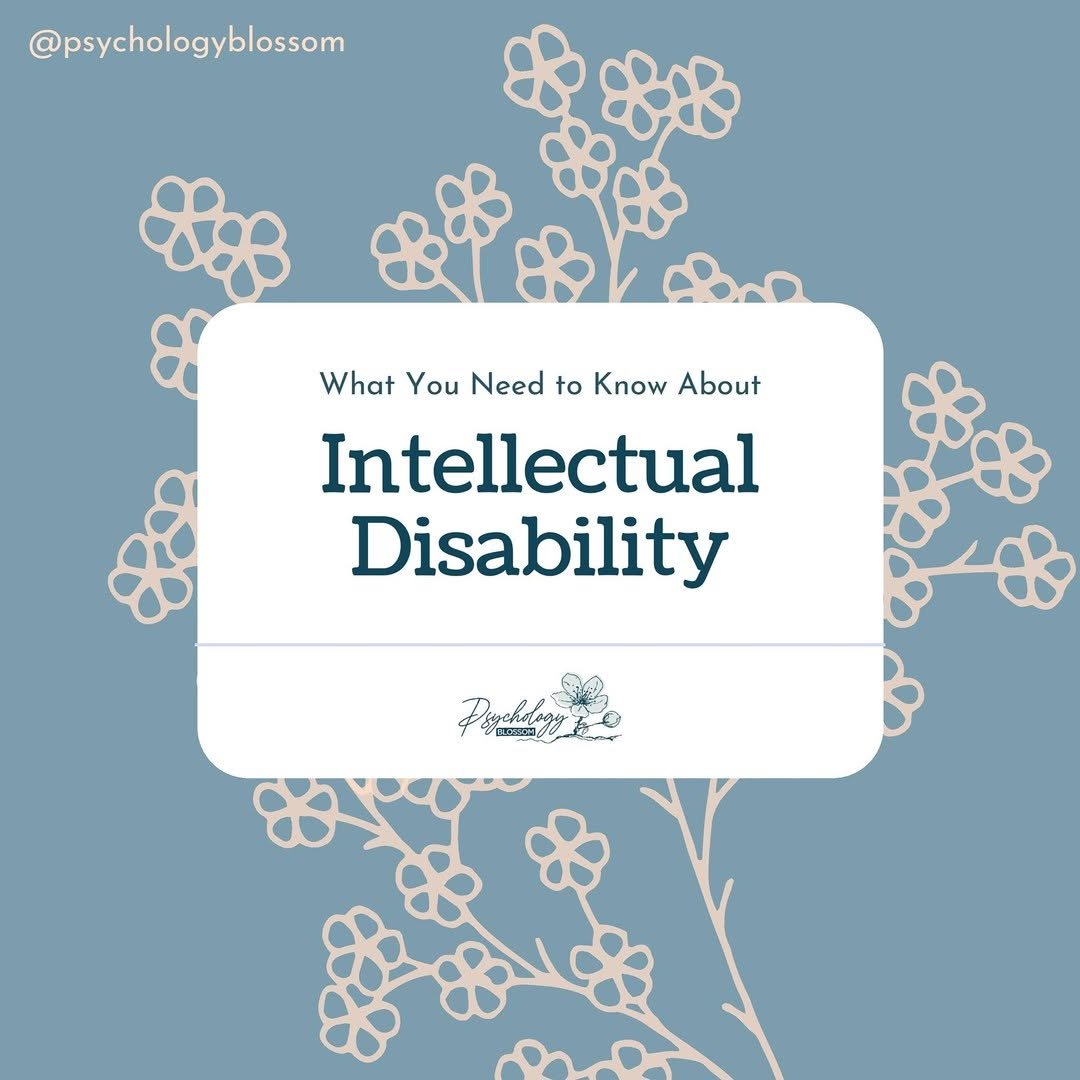Navigating Intellectual Disability: Signs, Supports & Hope
Intellectual Disability is a diagnosis given when an individual has difficulties in both intellectual functioning (the ability to learn, reason, make decisions, and solve problems) and adaptive functioning (the skills needed to live independently and participate in everyday activities).
Typically diagnosed before the age of 18, an individual with an intellectual disability may have problems speaking, reading, eating, taking care of themselves, or interacting appropriately with others. People with intellectual disabilities can and do learn new skills—often very well—but they generally learn them more slowly and may require tailored supports over time.
How Professionals Describe Severity
Severity is based on adaptive functioning across three domains—conceptual (learning, language, memory, problem solving), social (communication, relationships, judgment), and practical (self-care, work, money, daily routines). A clinician evaluates what supports are needed in each domain in everyday life, rather than focusing only on test scores.
Mild
Conceptual: In preschool, differences may be subtle. By school age, academic learning (reading, writing, math) is slower than peers; adults may have challenges with abstract thinking, planning, and short-term memory.
Social: Social interactions can be immature compared with peers. Reading subtle cues, understanding jokes or sarcasm, and regulating emotions may require coaching.
Practical: Independent in basic self-care but may need support for complex tasks like budgeting, transport planning, shopping lists, or organising household routines.
Moderate
Conceptual: Skills lag markedly behind peers throughout development. Ongoing help is needed to complete academic or daily conceptual tasks (reading forms, understanding schedules); others may take over certain responsibilities.
Social: Friendships are possible but communication differences can limit depth. Significant support is often needed in school or work settings to navigate expectations and group dynamics.
Practical: With teaching and repetition, individuals can manage personal care (eating, dressing, hygiene), though reminders and step-by-step guidance are often helpful.
Severe
Conceptual: Understanding of concepts like time, money, or quantity is limited; caregivers provide extensive support for problem solving.
Social: Spoken language may be limited to single words or short phrases focused on here-and-now needs. Enjoys relationships with familiar people; alternative communication (gestures, pictures, devices) is often beneficial.
Practical: Requires support for most daily living activities and close supervision to ensure safety and wellbeing.
Profound
Conceptual: Learning is centered on the physical world and concrete actions with objects. Motor or sensory impairments may further limit functional use of objects.
Social: Minimal understanding of speech or gesture; communicates primarily through nonverbal signals. Strong bonds with caregivers are common sources of pleasure and security.
Practical: Dependent on others for all aspects of daily living; may participate in simple home tasks with high levels of support.
Causes of Intellectual Disabilities
- Genetic conditions: e.g., chromosomal differences or single-gene conditions.
- Problems during pregnancy or childbirth: complications such as infections, exposure to toxins, birth trauma, or oxygen deprivation.
- Illness, injury, or infection during development: brain infections, head injury, severe malnutrition, or environmental exposures can contribute.
Assessment and Diagnosis
A comprehensive evaluation is conducted by qualified professionals (psychologists, developmental pediatricians, psychiatrists). It usually includes standardized assessment of intellectual functioning, detailed review of adaptive skills across home/school/work, developmental and medical history, and input from caregivers and teachers. The goal is to build a clear picture of strengths and support needs—not to label or limit potential.
Treatment, Education, and Supports
There is no single “cure,” but early and ongoing intervention can dramatically improve outcomes. Effective support plans are individualized, collaborative, and evolve across the lifespan.
Therapies and Interventions
- Speech and Language Therapy: Builds expressive/receptive language, social communication, and alternative/augmentative communication (AAC) where helpful.
- Occupational Therapy: Strengthens fine motor skills, sensory processing, daily living routines (dressing, feeding), and environmental adaptations.
- Behavioural Therapy: Teaches adaptive behaviours, emotional regulation, and reduces behaviours that interfere with learning; parent-coaching is often central.
- Physical Therapy: Addresses gross motor skills, balance, mobility, and participation in play or work tasks.
- Medical Management: Judicious use of medicines for co-occurring issues (e.g., epilepsy, anxiety, attention difficulties) when clinically indicated.
Educational Pathways
Children may attend mainstream schools with accommodations or specialized programmes. Placement depends on individual needs and the level of support required to access learning. Plans typically include measurable goals, assistive technology where appropriate, and classroom strategies such as visual schedules, task chunking, and hands-on learning.
Students who benefit from more targeted environments may enroll in Special Education (SPED) settings, where curricula emphasise functional academics, communication, social skills, and vocational readiness.
Transition to Adulthood
From the mid-teens, planning should shift toward adult life: vocational training, community participation, independent-living skills, transport training, and financial literacy. Adults with intellectual disabilities can enter supported employment, pursue skills upgrading, and contribute meaningfully with the right job-person match and workplace supports.
Community and Care Services
Depending on support needs, families may consider inclusive preschools, special student-care centres, centre-based day services, residential options, respite care, and home-based supports. Multidisciplinary teams help coordinate services across health, education, and social sectors so the person receives consistent, goal-aligned support.
Everyday Strategies for Families
- Learn about intellectual disabilities: Understanding strengths/needs empowers advocacy and reduces stress.
- Promote independence: Use step-by-step teaching, visual cues, and consistent routines. Praise effort and small gains.
- Encourage social participation: Playdates, clubs, sports, and structured groups build skills and confidence.
- Stay involved with school: Communicate regularly with teachers and therapists; reinforce skills at home.
- Plan for safety: Teach community safety, personal boundaries, and how to seek help; consider ID cards or phone safety features.
- Support caregiver wellbeing: Seek respite, peer support groups, and professional guidance as needed.
Addressing Myths and Stigma
Intellectual disability does not equal inability. With accessible teaching, respectful communication, and community inclusion, individuals achieve milestones that matter to them—friendships, purposeful work, independence in daily routines, and a good quality of life. Language matters: use person-first, strengths-focused wording (e.g., “a person with an intellectual disability”).
When to Seek Help
If you notice delays in communication, learning, self-care, or social skills, speak to your child’s healthcare provider or school team. Early identification connects families to services that support development and reduce secondary challenges like anxiety or behavioural difficulties.
Outlook
With the right supports at the right time, people with intellectual disabilities continue learning across the lifespan. Practical, meaningful goals—communicating needs, managing money with assistance, traveling safely, contributing at work—build autonomy and dignity. Progress is not linear; celebrate small steps and keep plans flexible.
Those who require child or adult care services may consider inclusive preschools, special student-care centres, or centre-based, residential, and home-care options. Children can attend Special Education (SPED) or mainstream schools depending on needs, and adults can access training and skills-upgrading programmes to prepare for work.
We recommend This Video to those who wants to learn more about Intellectual Disability.
About Us
We are a team comprising psychologists based in Singapore endeavouring our best to prioritise our clients’ needs. When you embark on this journey with us, we take a collaborative approach where you and your psychologist work closely together, and listen to what you have to say — No judgments, and in a safe space. Meet our Team
Quick Links
Contact Us
150 Cecil Street #07-02 S069543
Opening Hours
Monday to Friday: 8am to 6pm
Saturday: 8am to 2pm
Sunday: 10am to 2pm (Online only)
Admin Hours
Monday to Friday: 8am to 5.30pm
Saturday: 8am to 2pm
© Copyright 2023 – Psychology Blossom | Privacy Policy | Terms


